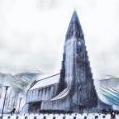Leaderboard
Popular Content
Showing content with the highest reputation on 01/26/2021 in all areas
-
Double fugue in gminor scored for 2x oboe, 2x bassoon in g minor. I think i will rearrange the fugue for two pianos... Written in the mid baroque style, so dont exptect those bach episodes 😉 Please telle me what you think. SimenN1 point
-
Thank you very much for taking the time to listening. Its true what you say, but the answer is the harmonic progression of the theme itself. In the mid baroque the fuges where based on the theme and the progression more then varaiety, like a chaconne or a passagalia. Its more of a varation work then a artistic meldoic piece, so there i agree. But this is written more for the techniqual side of composition more then innovative meldodic and artistic material. Yes i know of Federico Sardelli, he is a great musican, composer and conductor. I love hes music and admire hes talent. We are both members of accademia Vox Saeculorum, a group of professional musicans, conductors, historians and schollars who are dedicated to the revial of baroque music.1 point
-
Thank you Markus, i will try. I started with the main fugue subject. Early on i decieded to use one or more countersubjets to go along with the main theme. I will give a short analysis of the developement. Main subject: Bar 3 in the tenor voice has the exposition of what is to be one of the reoccuring countersubjects. I will call it main countersubject 1. Much of the developement of the is focused on the developement this countersubject. In bar 4 the tenor voce will go into the second main countersubject. The last of the four voices is free counterpoint. bar 1 - 23 is basicly a large exposition with the main theme and main countersubject 1 and countersubject 2 in different voices and toanlity (tonic or dominant). From bar 23 - 26 the main countersubject 1 is been developed. The voices will now have a exposition with this version of main countersubject 1 Bar 26 - 38 enters the first episode with figures from main countersubject 1 old version. The episode goes to different keys but ends in b flat major. Bar 38 - 44, short exposition of the main subject with new verision of countersubject 1 and countersubject 2. bar 44 - 50 Modulates back to g minor with an episodic sequence that ends in c minor Bar 50 - enters a new developement of countersubject 1 together with main countersubject 2 and the main subject in the key of c minor. There is an exposition of the final version of the main countersubject 1 from bar 50 - 56 Bar 56 is the entry of the second main subect. This subect is a developement of the final version of countersubject 1. In bar 60 enters the second main subject reoccuring countersubject. second main subject and 2nd main subjects countersubject 1 will enter togehter from here on out. Bar 55 -73 is the exposition of the second main fugue theme. Bar 73 the main subject, 2nd main subject and 2nd main subjects countersubject has exposition together in the key of c minor. This is the tematical developement and how the fugue is structured.1 point
-
Hey, thank you for your positive feedback and also for your inspiring words. I see you have a similar point of view like me. But as you said they are just personal opinions and I am happy that (my) music can develop different fantasies.1 point
-
Well - it ends on a C minor chord and the key signature suggests G# minor which you touch on in the middle of the piece. But I think with a piece that's this chromatic you would have been better off without a key signature at all and just using accidentals and spelling your enharmonics as logically as possible to the need of the moment. As far as musicality is concerned I really like it! It would sound good played really quietly in some kind of horror movie maybe. That's cool that you are branching out into a more experimental harmonic language. Always glad to see that composers keep an open mind to what can be musical and affecting. Great job!1 point
-
Yes those are my vocals - I have never in my life sang in tune so I had to decide to keep the best I could do! Funny enough I've never been taught to sing even though I've been taught to play the flute and compose music and use a DAW, so I practice on my own but there are still problems. I'm actually flattered you didn't say they were constantly out of tune 😛 I appreciate the comment, and it means a lot you think I struck a balance with the busy-ness. I was mindful to fill it to the brim but not an inch more. ❤️1 point
-
I personally loved this piece. It gave me the atmospheric feeling (pun intended) that I was floating through space, admiring the stars, nebulas, and galaxies alike. That being said, if I may, I would like to make a countercriticism to whether music about space should be emotional rather than nothing. It could be said that space is seemingly nothing, but I think that's part of the magic of it. Space is unknown. It's endless potential. We realize not only how small we are in comparison, but how much capacity for interesting stuff there is because of it. We inhabit a small space and there are so many wonderous things in this area alone. If so many amazing things exist in our small space, imagine how many amazing things are still out there! There's planets, nebulas, stars, asteroids, the possibility of other life! The countless, endless possibilities are mindboggling! There's an endless ocean that could hold any amount of unforeseen treasures. This is the very spirit of adventure. It is not the lack of stuff that can create a fascination with space, but the potential for it. A child is fascinating for the same reason. A child has seemingly endless potential, they can be anything! This same wonder is why so many pieces about space are grandiose and emotional. They encapsulate our smallness in comparison the the depths of space (hence the gigantic orchestra part) as well as the curiosity for what could be out there (hence the emotional part). Now that being said, I don't think there's anything particularly wrong with viewing space as empty, dead, or meaningless. That's the thing about potential, it's in the eye of the beholder. One person can view space as teaming with adventure while another void of anything the same way someone could view a child as being full of life and with the potential to become anything they want while someone else would see the child as being unprepared and naïve to everything life is about to throw at it. Neither view is wrong, they are simply two angles of looking at the same canvas. All that being said, I'm sure there are pieces out there that focus more on the 'dead' emptiness of space. And if not, then write one! Music has the endless potential to be anything in the hands of a composer, so if you wish something to come into being, then you have the power to do so!1 point
-
There's absolutely nothing wrong in being an amateur. I doubt many composers rely on composing for their main income. I don't but I'm always ready to accept reward for my work, quite rare but it happens. It's enough to have my work heard in public. However, I'm not sure that the "Orchestral and Large Ensemble" (where works would normally need a conductor) is the place for this kind of discussion though. In fact much of the forum is set up for discussion, categorised so people can focus on what they want to present or talk about. You may find the "Advice and Techniques" and "Composers' Headquarters" sections useful. In the sections about "Upload your compositions for analysis" it's worth learning to critique the work of others as this often helps someone view their own work and practices. Which particular piece on Soundcloud did you want feedback on - and have you a score for it?1 point
-
1 point


.thumb.png.8b5b433a341551e913a34392660bc95b.png)


